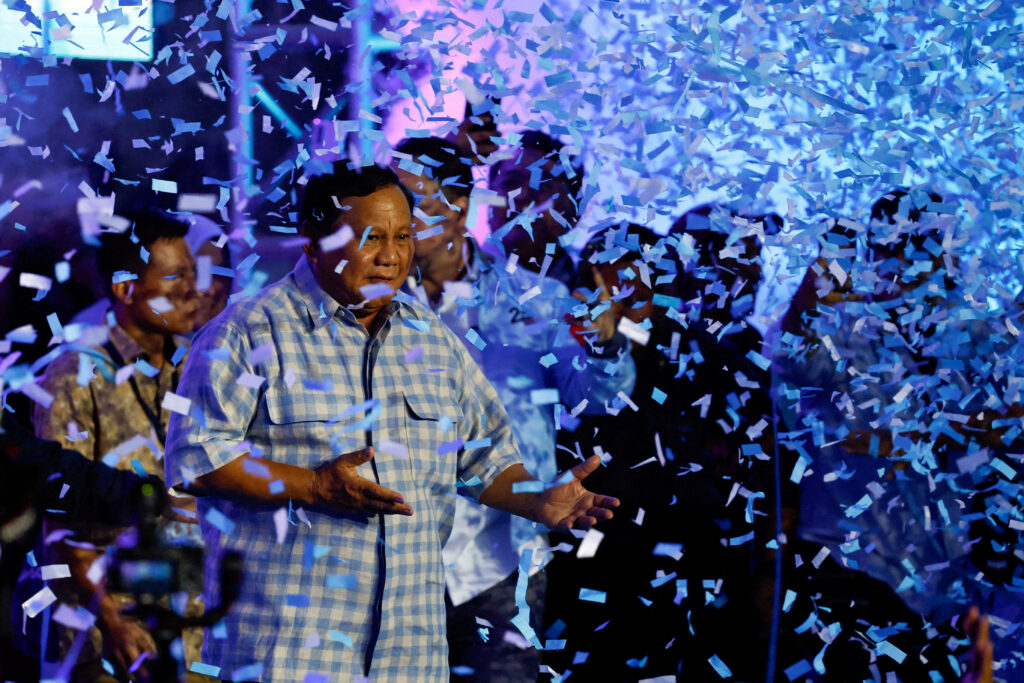In the end, Prabowo Subianto got the cake, albeit without the icing, in Indonesia’s presidential election on 14 February. The official tally, to be announced 20 March, looks set to confirm an unprecedented landslide for an incoming Indonesian president, with Prabowo having won 58 per cent of the vote in a three-way race, far exceeding the 50 per cent threshold required to avoid a runoff with his two rivals.
But Prabowo was denied the clean sweep that looked possible on election day, with his Gerindra party placing third in concurrent legislative elections. Former president Megawati Soekarnoputri’s PDI-P has likely re-emerged as the biggest party, which if confirmed would allow it to retain the strategic speakership of parliament — some consolation after President Joko Widodo (Jokowi), still officially a PDI-P member, abandoned the party’s presidential candidate to endorse Prabowo.
A priority for Prabowo and Jokowi now is containing the controversy over government interference in February’s presidential contest. After Jokowi’s son Gibran Rakabuming was appointed Prabowo’s running mate in October 2023, the worry was that it’d give the president incentive to use the powers of incumbency to tilt the playing field in Prabowo’s and Gibran’s favour.
That’s now a major point of controversy, with stories emerging of a widespread mobilisation of state institutions to give Prabowo and Gibran an official leg up. Notable were reports of police using the threat of corruption investigations to coerce local officials and community leaders into campaigning for the president’s favoured ticket.
While it’s clear there was an unprecedented effort on the part of an outgoing administration to help its preferred candidate, as Sana Jaffrey and Eve Warburton observe ‘it’s difficult to say with certainty whether or to what extent these sorts of tactics had a significant impact on the final result’.
Reports of underhanded efforts to aid Prabowo and Gibran — coming on the back of the legally dubious court decision that allowed Gibran to run in the first place — reinforce the impression that rules and norms have been bent at every turn to ensure an election outcome favourable to Jokowi’s team.
Even as Indonesia’s democracy has been battered by a decline in civil liberties in the Jokowi years, the consensus among experts has been that the free and fair nature of electoral competition remained resilient. For governments routinely to abuse the advantages of incumbency in ways that systematically disadvantage non-incumbents at elections would represent a worrying new chapter in Indonesia’s democratic decline where its categorisation as a democracy would fall into question.
Some are now pushing for the establishment of a parliamentary inquiry into the conduct of the 2024 elections. That would be a welcome development. Even if it were a highly politicised process, an inquiry would expose details of government efforts to advantage Prabowo in ways that might galvanise parties to strengthen safeguards to ensure fair play as Indonesia prepares for local elections in November 2024.
Jokowi, not keen to have Prabowo’s and his son’s victory tainted by controversy, won’t tolerate even the small chance that an inquiry spirals into a scandal that the government can’t contain. All the political inducements available are being wheeled out to dissuade parties from backing a probe. PDI-P has come under particular pressure, with its presidential candidate Ganjar Pranowo reported to the anti-corruption commission by a police-linked NGO after calling for the investigation. Members of Prabowo’s coalition are also hinting at legislative changes to strip PDI-P of its right to the speakership.
The basic legitimacy of Prabowo’s victory is not in question — his victory clearly reflects a genuine preference on the voters’ part for a candidacy that was sold to them as representing continuity with a popular government that brought stability and economic progress to the country. In the aftermath of the election Prabowo has been very cautious about flagging any policy ideas of his own, with his party even declaring that the formation of a transition team before this inauguration was unnecessary, so seamless will the continuation of Jokowi-era policy be.
Work is beginning to make Prabowo’s most high-profile policy promise, a program of free school lunches, workable. Analysis by one Indonesian media outlet suggested that if delivered on the scale flagged during the campaign, the program’s annual would cost up to 1.9 per cent of GDP. Jokowi’s administration is now working to downsize this into a more affordable format that allows Prabowo to claim the fulfilment of an election promise, but the free lunch idea is seen by investors in the context of Prabowo’s history of grandiose promises of state-led economic transformation.
Perhaps concerns about his fiscal trustworthiness in mind, Prabowo recently flagged his fealty to the key planks of ‘Jokowinomics’ in a speech to an investors’ forum in Jakarta. He reaffirmed his respect for Indonesia’s 3 per-cent-of-GDP statutory debt ceiling and promised to continue Jokowi’s program of streamlining the sprawling SOE sector while retaining state-owned firms’ strategic role in key sectors of the economy.
Brand ‘continuity’ thus endures after the election. So do the worries about where Prabowo might lead the country.
In an off-the-cuff remark that Prabowo’s made regularly in the past — but seldom in English — he told the same Jakarta forum that ‘democracy is really very, very tiring…very, very messy [and] very, very costly’, again observing that ‘there is a lot of room for improvement’.
As Indonesia prepares to hand custody of its democracy to such a prominent legatee of the New Order regime, confronting the risks to the integrity of its elections that the 2024 polls highlighted are a priority for its political class — if only out of their own self-interest.
Liam Gammon is Research Fellow at the East Asian Bureau of Economic Research, and a member of the East Asia Forum editorial board.

